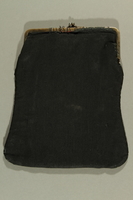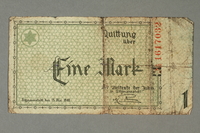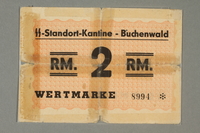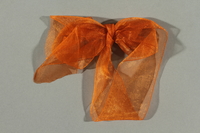Overview
- Description
- The collection documents the Holocaust experiences of Carl Heinz Rosner of Hamburg, Germany including his stay at a Jewish orphanage from 1937-1942; the deportation Rosner and his brother Joseph to the Buchenwald concentration camp; and his life as a post-war refugee in Stockholm, Sweden. The collection also includes a small amount of material related to the experiences of his wife Frieda Rosner and her parents Zelman and Judith Zeidshnur of Wilno, Poland (modern day Vilnius, Lithuania). Included are biographical materials such as passports, naturalization certificates, birth certificates, and wedding certificates; wartime correspondence of Jacob Ettlinger, a German Jew living in Stockholm who worked with several aid organizations and assisted Jewish refugees, including Carl and his mother Rachel Rosner; and photographs that depict pre-war lives of the Rosner and Zeidshnur families, Carl and his brother Joseph’s time at the orphanage, and post-war life in Haifa, Israel. Also included is Frieda Rosner’s autograph book from post-war Łódź, Poland.
The correspondence of Jacob Ettlinger contains letters sent and received in 1944. The correspondents include family members, refugees, Jews in concentration camps, and aid organizations. There is correspondence with Carl Rosner prior to his deportation to Buchenwald. There is also correspondence with the Seinfeld family regarding Carl and his brother’s deportation to Buchenwald, and whether or not to inform their mother Rachel Rosner because of her mental health at the time. The letters are arranged alphabetically.
A: Abel, Isidore; Aktiebolagst Aerotransport; American Legation in Stockholm; Anderson, Ludwig; Anderson, Alfred; Andersson, David; Auerbach, Marta, Auerbach, Philipp.
B: Baer, J.F.; Bamberger, Rechy; Berlas, Chaim, Barth, Otto; Benzian, Silvia; Bergman, Dick; Bergstein, T.; Berlinger, E. [Rabbi]; Bindefeld, A.; Bodenheimer, E.L.; Bromma Judiska Försammling; Bulka, Paul; Buren, Irvin; Böyesen, Svein.
C: Centrala Hjälpkomittén för Leningrads Barn; Centralpostkontoret; Cohn, Arnold; Cohn, Georg; Cohn, Paula.
D: Danska Förläggningen; David, Albert; Diefenbronner, Elsa; Diefenbronner, Erich; Diefenbronner, Hermann.
E: Emanuel, Jacob; Emigranternas Siälvhjälp; Ettlinger, Erna; Ettlinger, Helene; Ettlinger, Leo; Ettlinger, Maier.
F: Feist, Edwin; Feist, Mrs. Philippe; Fischhoff, Franz; Fleischman, Paul; Fleischman, Rebecka; American Jewish Congress regarding Max Friediger; Fürth, Hildegard.
G: Goldberger, Franz; Goldschmidt, Victor; Goldstein, Heimann; Gordon and Tankus; Gorgéns electrical company; Grünberg, A.; Grünstein, Mrs. S.; Grönblom, Berndt.
H: Haitkin, Sam; HEROS Handels AB; Hirsch, Bernard; Hirsch, Frank; Hollander, Arthur; Hollander, Fritz; Horovitz, Leo; Hultsfora Sanatorium; Hüttner, Julius.
I: Ischenhäuser, Elias; Ischenhäuser, Rachel; Igell, Nissen; International Red Cross.
J: Jacobsson, A.J.; Jacobson, Wolf; Jacoby, Käthe; Jaffe, Moses; Josephson, Gunnar. - Date
-
inclusive:
1920-2010
bulk: 1930-1957
- Credit Line
- United States Holocaust Memorial Museum Collection, Gift of Carl Rosner
- Collection Creator
- Carl H. Rosner
Zeidshnur family - Biography
-
Carl Heinz Rosner (born Karl Heinz Rosner, 1929-) was born on 4 April 1929 in Hamburg, Germany to David and Rachel (née Hausner) Rosner. He had two brothers, Elliot Helmut and Joseph Wolfgang. David and Rachel married in 1928, and co-owned a bedding business. His family had all planned on immigrating to Palestine, beginning with his grandparents in 1934. Carl’s parents divorced around 1935, and David returned to Romania, where he was born and had citizenship. Rachel sent Elliot on a Kindertransport to Sweden around 1937, and she followed by 1939.
In 1937, Carl and Joseph were sent to a Jewish orphanage in Hamburg. The orphanage was liquidated in 1942, but they were spared deportation due to their Romanian citizenship related to their father. They were able to get shelter and aid from the Seinfeld family, who were in a mixed marriage, and lived nearby. Carl and Joseph lived in a retirement home in the area, and worked in the kitchen. They moved with the Seinfelds to a hospital after their neighborhood was destroyed in air raids. They remained there until Carl and Joseph were deported to the Buchenwald concentration camp in June 1944.
After the camp was liberated in 1945, they went back to Hamburg for a few weeks. They then were able to go to a displaced person’s camp in Denmark, and then to Stockholm, Sweden where they were reunited with their mother and brother Elliot. Carl began studying engineering, and also met Frieda Zeidshnur, who was also a Jewish refugee. They married in Israel in 1948, and briefly lived in Haifa before immigrating to the United States in 1952. They settled in Schenectady, New York where Carl worked for General Electric. Frieda worked with helping resettle Russian immigrants and was a substitute teacher in a Hebrew school. They have two daughters, Elizabeth and Monica, and one son, Raphael.
Frieda Rosner (née Fryda Zeidshnur, 1930-2000) was born on 4 July 1930 in Wilno, Poland (modern day Vilnius, Lithuania) to Zelman (1895-1960) and Judith (née Elkind, 1896-1984?) Zeidshnur. Frieda’s mother was a doctor, and her father co-owned a wholesale clothing business with his family. In 1941, they were sent to the Wilno ghetto. Judith was able to arrange for Frieda to escape the ghetto, and she was hidden by a Christian family with a farm. Her parents were also able to escape, and they joined Frieda on the farm. They remained hidden there for the duration of the war, periodically paying the farmer with valuables Zelman had hidden near their home. After the war, the Zeidshnurs returned to Wilno, but found no relatives. They then went to Kaunas, Lithuania in hopes of finding relatives, but were not successful. After encountering difficulties and continued anti-Semitism, they were able to move to Stockholm, Sweden. Judith and Zelman immigrated to the United States in 1951, and settled in Newark, New Jersey.
Physical Details
- Genre/Form
- Photographs. Correspondence. Passports. Autograph books.
- Extent
-
1 box
2 oversize boxes
- System of Arrangement
- The collection has been arranged as three series. Biographical materials, 1924-2010; Correspondence, 1944; 1955; Photographs, 1920-1955.
Each series is arranged alphabetically by folder title. The correspondence of Jacob Ettlinger has been removed from the binder, but retains his arrangement.
Rights & Restrictions
- Conditions on Access
- There are no known restrictions on access to this material.
- Conditions on Use
- Material(s) in this collection may be protected by copyright and/or related rights. You do not require further permission from the Museum to use this material. The user is solely responsible for making a determination as to if and how the material may be used.
Keywords & Subjects
- Topical Term
- Jewish families--Germany--Hamburg. Jewish families--Lithuania--Vilnius. Jewish orphanages--Germany. Holocaust survivors--Germany. Holocaust survivors--Poland. Refugee children--Germany. Refugees, Jewish--Sweden. Jewish ghettos--Lithuania--Vilnius. Emigration & immigration--Palestine--1940-1950. Emigration & immigration--United States. Holocaust, Jewish (1939-1945)--Children.
- Geographic Name
- Vilnius (Lithuania) Hamburg (Germany) Stockholm (Sweden) Haifa (Israel)
- Personal Name
- Ettlinger, Jacob, 1880-1952. Rosner, Carl Heinz, 1929- Rosner, David. Rosner, Rachel. Rosner, Joseph Wolfgang. Rosner, Elliot Helmut. Zeidshnur, Frieda, 1930-2000. Zeidshnur, Zelman, 1895-1960. Zeidshnur, Judith, 1896-1984?
- Corporate Name
- Buchenwald (Concentration camp)
Administrative Notes
- Holder of Originals
-
United States Holocaust Memorial Museum
- Legal Status
- Permanent Collection
- Provenance
- Donated to the United States Holocaust Memorial Museum by Carl Heinz Rosner in 2016.
- Record last modified:
- 2023-02-24 14:27:17
- This page:
- https://collections.ushmm.org/search/catalog/irn539408
Additional Resources
Download & Licensing
In-Person Research
- Available for Research
- Plan a Research Visit
-
Request in Shapell Center Reading Room
Bowie, MD
Contact Us
Also in Carl Rosner Collection
The collection consists of one Łódź ghetto note, one Buchenwald coupon, a purse, a ribbon, an autograph album, documents, and photographs related to the experience of Carl Rosner in prewar Germany, in Buchenwald concentration camp during the Holocaust, and in Sweden after the war, as well as to the experiences of his wife Frieda Zeidshnur in Łódź, Poland.

Black purse
Object

Łódź (Litzmannstadt) ghetto scrip, 1 mark note
Object
1 [eine] mark receipt issued in the Łódź ghetto in Poland beginning in May 1940 until the ghetto was liquidated in summer 1944. Nazi Germany invaded Poland on September 1, 1939, and occupied Łódź one week later. Łódź was renamed Litzmannstadt and, by February 1940, the Germans forcibly relocated the large Jewish population of 160,000 into a small, sealed ghetto. All residents had to work and many were forced laborers in ghetto factories. Residents were forbidden to have German currency, and the Jewish Council was ordered to create a system of Quittungen [receipts] that could be used only in the ghetto. The scrip, sometimes referred to as rumkis, after the Elder of the Judenrat, Mordechai Rumkowski, was issued in 7 denominations: 50 pfenning, 1, 2, 5, 10, 20, 50, and 100 marks, as well as coins. It acted as a labor incentive and facilitated the confiscation of money and goods from internees. There was little to exchange it for in the ghetto. Living conditions were horrendous; the severe overcrowding and lack of food made disease and starvation common. In January 1942, mass deportations to Chelmno killing center began; half the residents were murdered by the end of the year. In summer 1944, Łódź, the last ghetto in Poland, was destroyed and the remaining Jews were sent to Chelmno and Auschwitz-Birkenau killing centers.

Buchenwald Standort-Kantine concentration camp scrip, 2 Reichsmark
Object
2 Reichsmark coupon issued at Buchenwald concentration camp in Germany. Buchenwald opened on July 19, 1937, and issued undated notes in 0.5, 1, 2, and 3 mark denominations. The simply designed notes were printed on coarse paper. There were two types of coupons: canteen scrip and exchange scrip issued to members of outside labor brigades [Aussenkommandos.] In early April 1945, as US forces approached Buchenwald concentration camp, the German guards began to evacuate the camp. On April 11, the prisoners revolted and seized control of the camp. Later that day, soldiers from the Sixth Army Armored Division, part of the Third Army, arrived in camp and discovered more than 21,000 starved and ill inmates.

Ribbon
Object



